|
|
|
Sort Order |
|
|
|
Items / Page
|
|
|
|
|
|
|
| Srl | Item |
| 1 |
ID:
127871


|
|
|
|
|
| Publication |
2014.
|
| Summary/Abstract |
In order to meet its 2050 target of 80% carbon emissions reduction, the UK is facing a challenge of restructuring its energy system, possibly by introducing more decentralised energy (DE) systems.Following semi-structured interviews, four exemplar international cases have been critiqued in order to investigate the variety and interrelationship of the drivers and barriers involved during their implementation, and then compared with the barriers and drivers that can potentially affect the implementation of similar projects in the UK context. The impacts of the barriers on the outcomes of these projects were evaluated, and recommendations were presented on overcoming these barriers if replicating similar projects in the UK context. Governance drivers play the most significant role, whereas financial drivers (commonly believed to be crucial), are deemed to play a lesser role. Social, governance and financial barriers rather than technological barriers constitute the central problem areas for the increased adoption of DE. The drivers and barriers experienced in the international cases were similar to those anticipated in the UK. The case studies present a high potential for replication and scaling up in the UK context and demonstrate that the increased implementation of DE systems could also enhance social and governance benefits.
|
|
|
|
|
|
|
|
|
|
|
|
|
|
|
|
| 2 |
ID:
125281


|
|
|
|
|
| Publication |
2013.
|
| Summary/Abstract |
Disasters are not only increasing in number, they are becoming more complex as natural and man-made crises combine to cause mega-disasters. Rapid urbanization, population growth, political unrest, and migration have created fragile environments in many countries, and boundaries are blurring between complex emergencies and chronic vulnerability in places such as the Democratic Republic of the Congo and Somalia. These factors have resulted in intense pressure on the UN's humanitarian organizations and partners to respond more quickly when disaster strikes and to be more effective in its response.
|
|
|
|
|
|
|
|
|
|
|
|
|
|
|
|
| 3 |
ID:
127869


|
|
|
|
|
| Publication |
2014.
|
| Summary/Abstract |
As the President of the Office of Competition and Consumer Protection refused to approve a government initiated takeover in the Polish power sector and the Court of Competition and Consumer Protection did not make a ruling on that case, the takeover was finally prohibited. In this context, the main aim of this paper is to carry out a quantitative analysis of the impact of the takeover in question on electricity prices and quantities, consumer and producer surpluses, dead weight loss and emissions. The scope of the study covers the Polish power generation sector and the analysis was carried out for 2009. A game theory-based electricity market equilibrium model developed for Poland was applied. The model includes several country-specific conditions, such as a coal-based power generation fuel-mix, a large share of biomass co-combustion, etc. For the sake of clarity, only four scenarios are assumed. The paper concludes that the declared synergy savings did not compensate for the increase in dead weight loss and the transfer of surplus from consumers to producers caused by increased market power.
|
|
|
|
|
|
|
|
|
|
|
|
|
|
|
|
| 4 |
ID:
118482
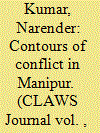

|
|
|
| 5 |
ID:
116149
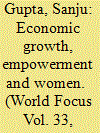

|
|
|
| 6 |
ID:
127807
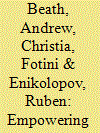

|
|
|
|
|
| Publication |
2013.
|
| Summary/Abstract |
In societies with widespread gender discrimination, development programs with gender quotas are considered a way to improve women's economic, political, and social status. Using a randomized field experiment across 500 Afghan villages, we examine the effects of a development program that mandates female participation. We find that even in a highly conservative context like Afghanistan, such initiatives improve outcomes specific to female participation in some economic, social, and political activities, including increased mobility and income generation. They, however, produce no change in more entrenched female roles linked to family decision-making or in attitudes toward the general role of women in society.
|
|
|
|
|
|
|
|
|
|
|
|
|
|
|
|
| 7 |
ID:
131955
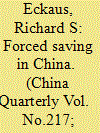

|
|
|
|
|
| Publication |
2014.
|
| Summary/Abstract |
The explanation offered here for the high rates of saving in China is that much of the saving has been "forced" in two Benthamite senses. Involuntary saving, the first of Bentham's meanings, includes taxes which finance investment. These have made up more than half of the total savings in China in recent years. There is also forced saving in China in the form of Bentham's second sense, conduced saving, resulting from bank loans which have financed investment. While the existence of a savings glut has been suggested for China, a better characterization would be that it has had a high rate of investment.
|
|
|
|
|
|
|
|
|
|
|
|
|
|
|
|
| 8 |
ID:
127329
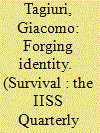

|
|
|
|
|
| Publication |
2014.
|
| Summary/Abstract |
A more prominent and direct European role in the protection of cultural heritage and promotion of the arts could revitalise an exhausted integration process.
|
|
|
|
|
|
|
|
|
|
|
|
|
|
|
|
| 9 |
ID:
127591
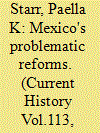

|
|
|
|
|
| Publication |
2014.
|
| Summary/Abstract |
President Enrique Peña Nieto's first year in office (he was inaugurated in December 2012) was impressive, but also disappointing. The new administration's legislative achievements, including a series of long-awaited economic reforms, were striking in both number and content. Yet these accomplishments were accompanied by severely compromised fiscal and political-electoral reforms, an absence of anticorruption legislation, a sharp economic downturn caused mainly by government missteps, and a lack of sustained policy attention to the country's security situation. For the Mexican public, these last two failings weigh much more heavily on their everyday lives than the potential benefits from reforms approved by politicians who rarely seem to legislate with the citizenry in mind. Opinion polls show the lowest public support for any presidential administration in decades.
|
|
|
|
|
|
|
|
|
|
|
|
|
|
|
|
| 10 |
ID:
101998
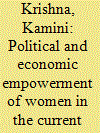

|
|
|
| 11 |
ID:
103159
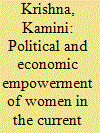

|
|
|
| 12 |
ID:
152040
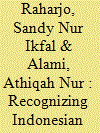

|
|
|
|
|
| Summary/Abstract |
This study examines the role of fisherwomen in fishery resource management in Talaud Island District, North Sulawesi District, Indonesia. Several focus group discussions, interviews and questionnaires with fisherwomen and fishermen community as well as relevant stakeholders in Talaud Islands were conducted to collect data about the issue. The results of the research show that most of the fisherwomen in the particular area earn a living as collecting mussels, making and repairing nets, trading fish, and processing fish products. Trading and processing are the sub-sectors where women’s roles are over-represented which are low-grade unskilled jobs. However, the paper argues that the contribution of women in the fisheries sector has not been adequately reflected in policies and not yet transformed into women’s economic empowerment. The paper concludes that women’s roles and contribution to fishery family welfare and national development must be recognized by relevant government agencies and accomodated in national and local policies. These roles also should be transformed to women’s economic empowerment.
|
|
|
|
|
|
|
|
|
|
|
|
|
|
|
|
| 13 |
ID:
127765


|
|
|
|
|
| Publication |
2014.
|
| Summary/Abstract |
This article describes and analyzes two approaches in South Korean civil society to the issue of human rights in North Korea: a civil and political rights-based approach and an economic, social, and cultural rights-based approach that emphasizes the right to food. By analyzing the relationship between the policy stances of South Korean administrations in respect of North Korean human rights (NKHR) and NGO (nongovernmental organization) advocacy, this essay argues that South Korean humanitarian and human rights NGOs contributed to the adoption of different human rights norms in South Korean society. Since 2000, South Korean humanitarian NGOs separated civil and political rights (CPR) concerns from economic, social, and cultural rights (ESCR) concerns and selectively adopted the latter by limiting these human rights to the "right to food." Under the hard-line policy of the Lee Myung-Bak administration (2008-2012), South Korean human rights NGOs resumed active advocacy targeting the international community by exposing poor CPR situation in North Korea through transnational human rights networks given the CPR approach and this led to the dominance of the CPR approach in South Korean civil society. Thus, humanitarian and human rights NGOs in South Korea narrowed the focus of human rights norms to CPR and this emphasis influenced and shaped the way later political administrations in South Korea viewed human rights issues related to North Korea.
|
|
|
|
|
|
|
|
|
|
|
|
|
|
|
|
| 14 |
ID:
127767
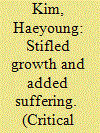

|
|
|
|
|
| Publication |
2014.
|
| Summary/Abstract |
The United States rhetorically promotes a nuclear-free North Korea with an open economic system, eager for the country to become an integrated member of the global community. Sanctions Washington has imposed on Pyongyang since the outbreak of the Korean War, however, have failed to advance this objective. Indeed, sanctions have proven to be counterproductive. While having a negligible effect on North Korea's nuclear and missile programs, sanctions also restrict the inflow of foreign investment, thereby stymieing North Korea's efforts to recalibrate its economic system. The dearth of foreign investment further limits the establishment of market-based exchanges that would facilitate economic liberalization, a process that could improve economic security in North Korea. It is the North Korean people, moreover, not the governing elite, who bear the ultimate costs and suffer under these sanctions, creating undeniable tension when considering the causal relationship between economic sanctions and human rights. Despite assurances offered by U.S. administrations that sanctions policies exclusively target the government, this article argues that economic restrictions play a significant role in the country's economic woes, inhibiting Pyongyang from improving the standard of living for the North Korean people and failing to promote an improvement in basic economic rights.
|
|
|
|
|
|
|
|
|
|
|
|
|
|
|
|
| 15 |
ID:
128086
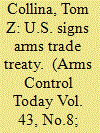

|
|
|
|
|
| Publication |
2013.
|
| Summary/Abstract |
The United States and 17 other countries signed the Arms Trade Treaty (ATT) on Sept. 25, pushing the number of signatories to the pact, which was opened for signature June 3, to 107.
Calling it a significant step toward controlling the illicit trade in conventional weapons, Secretary of State John Kerry signed the treaty on behalf of the United States, the world's largest arms exporter, in a ceremony at the United Nations. "This is about keeping weapons out of the hands of terrorists and rogue actors," Kerry said.
"It's significant that the United States, which [accounts] for about 80 percent of the world's export in arms, has signed," Australian Foreign Minister Julie Bishop told a news conference. In 2012, states engaged in arms transfers totaling more than $85 billion, not including black market transfers, according to the Congressional Research Service.
|
|
|
|
|
|
|
|
|
|
|
|
|
|
|
|
|
|
|
|
|